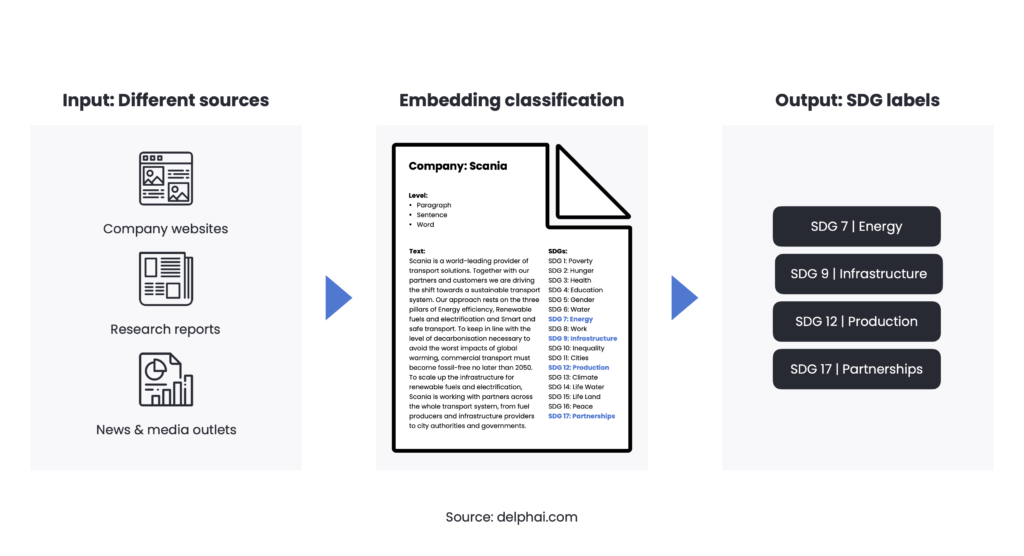Tech for Good refers to the use of digital technologies to address social and ecological challenges. Artificial intelligence (AI), for example, is commonly used to improve energy efficiency, production processes, and crop yields. Yet, there is vast untapped potential in AI, especially when it comes to sustainability analysis. The technology can rigorously and accurately process data with unprecedented speed. This article looks behind the scenes of delphai’s AI technology and how it can enable organizations to assess their sustainability potential.
As a globally-accepted framework, the Sustainable Development Goals (SDGs) set by the United Nations in 2015 are a common starting point for businesses when analyzing their social and environmental impact. Each SDG is divided into multiple sub-targets and measured through various indicators. The wording of each goal and target is highly specific in order to ensure that all relevant impact areas are covered. As a result, analyzing business activities in regard to the 169 targets has become an exceptionally complex task. Yet, in instances where humans fail to detect or comprehend intricate nuances, AI uses Natural Language Processing (NLP) to label text data and run a comprehensive analysis.
Why AI Is the better problem solver
Artificial intelligence is the solution to complex data analysis challenges. In terms of analyzing sustainability potential, organizations using AI benefit from:
- Accuracy. Manual tasks are often repetitive and leave great room for error. Furthermore, humans naturally have subjective perceptions that, often unintentionally, affect their interpretation. As a result, people could label the same data differently. In comparison, algorithms continuously use the same analytical framework and process. Automation through a properly trained algorithm thereby greatly reduces the risk of human error and eliminates unnecessary delays such as reviews.
- Speed. Alongside the potential of human error, the time required to perform tasks manually is often substantial. Just imagine how long it would take a human to analyze a company’s sustainability potential by going through its entire internal and external documentation. With the help of AI, analyzing data has become a matter of seconds.
- Rigour. As amazing as the human brain is, it simply cannot compete with cutting-edge technology when it comes to analyzing cascades of data within seconds. Here AI has a clear advantage, especially in regards to recognizing underlying patterns between various data points.
From incoherent data to SDG analysis
Equipped with these advantages, AI has the power to analyze and measure the impact potential of all kinds of players, especially in the private sector. With AI on their side, businesses are empowered to analyze current activities, identify sustainability potential relative to their industry and market, and hence, are able to communicate their efforts.
How can AI help, exactly?
delphai leverages the power of AI to classify and label business activities based on the UN Sustainable Development Goals. The methodology identifies the relation between texts and the 169 targets.
This is what happens when an organization wants to analyze its sustainability potential:

- delphai scans available data sources such as websites, reports, and/or internal documents within seconds. Based on the word embedding technique, AI-classifiers are assigned to the available data according to the specifications provided by the SDGs. This even works when the provided texts do not contain exact words and phrases, as delphai works with semantic spaces that identify closely related words such as IIOT and Industry 4.0.
- Based on this process, the AI attributes none, one, or multiple SDG labels to each piece of data. On the aggregate level, the SDGs the organization is likely to already have a positive impact on are visualized.
- Furthermore, the AI is also able to find correlations between SDGs within the company’s analysis, in order to provide a more complete picture of its sustainability potential.
The same process applies when analyzing competitors, industries, or markets. Once the output is generated, impact focus is easily identified, and a sound sustainability strategy can be developed. As a result, organizations will be equipped with accurate data to transparently communicate their contribution towards the global SDGs.
Schedule a meeting and learn more about delphai and how AI can enable organizations to unlock their sustainability potential

